#eg caregiver or child
Text
also I think the extreme brain fog I've been experiencing lately may meet the criteria for outright delirium, yaaay
#I have felt like 'this feels like early-stage dimentia but it can't be that'#and apparently differential diagnosis between the two is Complicated#so.#also all these symptom guides and stuff are written for an external perspective#eg caregiver or child#because I guess they assume it only happens to old people who don't know how to google#(I did mention this to arin and she was dismissive of it.)#(so. that's cool.)#(I don't feel like she understands what I meant because I'm already used to masking for disorientation distress and memory loss)
0 notes
Text
Caregiver Husk Headcanons
TW: Hazbin Hotel contains adult themes. But this post is completely SFW!
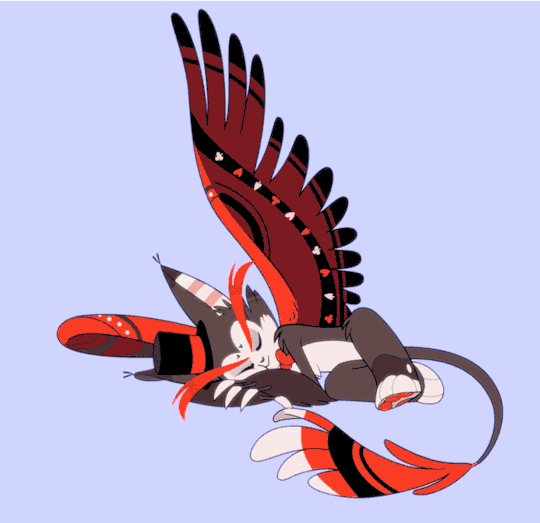
Probably found out about your regression after you visited the bar one night, close to tears. Instead of immediately letting you drink away your sorrows, he tried talking to you.
Eventually, after requesting some hugs and soft, childish speech, he realized something was up. But in the moment, he just stayed patient and took you to bed.
After a conversation with you the next morning, you admitted to having age regression. He was confused at first, but understanding after you explained it all.
He expressed concern of you being by yourself when you had the headspace of a child, and told you to come find him if you ever needed anything.
Eventually it just became routine.
You would hunt him down, whether he was at the bar or his room, and he would keep you busy. He found some gear for you too, after seeing you chew your hands and pull his tail one too many times out of boredom.
So. Many. Stuffies.
(His drinking habits have significantly cut back since he started caregiving)
You had to reteach the grumpy old man how to play again though
There was quite a lot of disapproval the first time you sat down for a tea party, and Husk just sat there watching awkwardly instead of participating.
He still prefers hands-on games like Hide-and-Seek or tag in comparison to imaginative play (he has no creativity), but he will do whatever you ask because seeing you smiling makes his heart melt
His favorite thing is board/card games. Uno and Go Fish galore.
He always lets you win, and makes it convincing (perks of having a poker face)
He may or may not teach you to gamble using stickers and Goldfish crackers
You love seeing his card tricks!
Husk doesn’t have very many rules, but what few he does, he is very strict about. (eg. no sharp objects, no cooking without his supervision, stay out of the bar, etc)
Prefers to go with the flow rather than having a strict schedule for you. Whatever you want to do in the moment is fine by him.
If you are overstimulated, he lets you calm down by petting his fur or wings (which is a very special privilege reserved for you and eventually Angel)
This man is the best at reassurances.
Always tells you how proud of you he is, that you deserve all the love in the world, you’re safe and cared for, etc.
Takes care of your needs without question or judgment. Whatever food preferences, comfort items, accommodations–he’s got it.
Doesn’t really like leaving you with a babysitter, as he doesn’t trust anyone else to properly care for you. If he really has to, he’ll leave you with Charlie or Angel. They’re like older siblings to you. (Never in a million years would he leave Alastor or Niffty in charge.)
Husk isn’t very creative with pet names. He mostly just calls you ‘kiddo’ or ‘hun’.
He doesn’t really do baby talk; however he is always smiling softly and listening whenever you’re babbling about whatever.
If you have a nightmare or a meltdown, he keeps his cool. Usually, you get calmed down just by cuddling with him (he’s sooo soft). Then, he’ll turn on a movie or read to you until you fall asleep.
Alastor teases him for his ‘motherly instincts’ constantly.
As such, Husk flips him off constantly.
You started to do the same, and now Husk is trying to get you to stop. (with no success so far) Alastor is amused by the struggle.
#agere community#hazbin hotel agere#little space#sfw interaction only#sfw agere#sfw regression#cute#hazbin hotel husk#hazbin husk#husker#agere caregiver#caregiver husk#cg husk#Husk comfort#hazbin hotel age regression#hazbin hotel reader#reader insert#hazbin reader insert
56 notes
·
View notes
Note
Ahhh!! I’ve just been thinking about a Mowglie!Spider AU for so long now!!! I’d love to hear more about it if you have any more ideas. What was it like being raised by animals and Eywa?
I’m so glad you liked it/ asked !!!❤️❤️
Okay so, as for what it was like being raised by Eywa / animals of Pandora:
Spider is definitely big on community since was raised almost collectively if that makes sense? So like every animal would show him things that are more specific to them
EG: the Prolemuris or the Syaksyuk (the blue monkey things from the fisr movie) would have been the animals that taught Spider how to be a better climber, like how to find those invisible grips and how to swing from branches.
or like Direhorses / Pa’il would show him how to control his breathing better so that he could run more
(Granted all these lessons would need a lot of patience as they can’t used words)
But I think his primary caregiver/ closest thing to a physical parent would be the Thanator mother and her cub. (I see them as only normally having one or two cubs who they stay with untill they are in their adult hood. So they’re very protective of their territory/nests and will react violently to any perceived threat)
She’s the one who raised him while he was still a baby. She’s the one he’ll go to at night to sleep with because he feels the safest around her. He definitely takes on more of her animalistic characteristics because of that.
His upbringing was definitely difficult, more so when he was still a baby and couldn’t really communicate at all. A lot of it was trial and error.
I also think his Thanator mum barely stands it when he’s with other animals but she knows he’ll come back/ there are things she can’t teach him.
They are very protective of their young and it’s really difficult for them when they can’t see their child at all times
Spider doesn’t tend to speak much (the only language he does speak is Na’vi) bc the only time he has to do it is when he’s communing with Eywa and the ancestors so I think he’d be more inclined to using animal noises
I think he would adapt the various noises he uses depending on the animal he’s with, but it always tends to lean closer to the thanator (like a child learning their parents accent)
I also decree that Spider can replicate these noise perfectly because come on, he was raised around them & he’s Eywa’s special little guy
He’s defo a messy eater (I already said this but, he’s really really messy), he spends the first few years just eating meat raw because he wouldn’t have been introduced to fire (this doesn’t make him overly sick, it just doesn’t taste as good)
He probably only learned how to make fire because Eywa refused to let him disconnect from the spirit tree without him taking on and learning how to cook his damn food
Eywa defiantly took a far more active role in his upbringing, especially when he was a baby.
EG: she’d use the Atokirina to guide him around after he’d learned to walk, to help him find his way back if he ever got lost, lead him away from danger before he ever knew he was in it.
When he would cry uncontrollably as a baby the Atokirina would enable him to feel her presence more closely and it would be very comforting (something his Thanator mum was very thankful for) (he also learned to feel her just as closely without their help once he got older)
I don’t think he’s really aware of how significant his connection with Eywa is (despite how blatantly obvious it is to literally anyone else)
Bc the animals are obviously very closely connected with her, but they can’t tell him that what he feels isn’t the norm
His sense of fear is definitely not where it really should be because he has absolutely no problem going to places / doing things that would give others heart attacks because of how much he can feel eywa
EG: if he’s diving off large waterfalls into the water below, he’ll keep going until he climbs too high and feels this sense of danger/displeasure and he knows Eywa doesn’t want him to do that because it isn’t safe
Or if he’s not sure if something is safe to eat (probably human food) he’ll wait to see if he either gets a warm sensation in his stomach or like a quick jolt of discomfort
But this also means that when he can’t feel her (like being in the human base) sends in into panic, it’s like suddenly losing one of you important senses with no warning
I think he’d play around with other animals a lot and some of them would treat him like their own young
Eg: Ikran would nip at him like they do to their little ones to get them to try and bite back/just to play with them.
He also try’s to be independent and since he’s a kid he sometimes won’t heed Eywa’s warning
I’m sorry by having an almost teen rebellion against the literal god / planet is just the funniest thing to me 😂
Fan lizards love him but definitely hold a grudge against him 😂
You can’t tell me he wouldn’t have had fun running around annoying them as a little kid (he still does it now)
Very much into roughhousing because that’s how he played with his Thanator sibling.
He also only learned about modesty from they other Na’vi through the spirit tree / seeing some humans from a distance but not understand a thing about them
Also Eywa makes it very clear to him he needs to wear pants
Spider has never interact with a human, he actively avoided them throughout his early childhood
Like he just thinks they are the weirdest creatures ever with how out of place they look 😂
He also doesn’t like getting close to hells gate because the closer he gets to the building, the quieter Eywa gets and he absolutely hates that!
He’s never interacted with a na’vi / seen them up close but he’s more open to the idea than he is about humans
I’m not entirely sure if he can actually hear Eywa speak (if he can it’s only when he’s connected), but he can definitely feel her embrace him / feel her in the world around him. He also definitely feels her / views her as a mother in a more literal sense (something she’s happy with bc that’s her fearless and feral little boy)
Okay so for more general ideas / plot-ish ideas :
Kiri is the first Na’vi he’s seen up close and it was entirely by accident 😂
She probably tried to talk to him in English but he didn’t understand a word she said, so he tries his broken Na’vi (think small child who doesn’t talk much, not great at putting sentences together, but good enough that you get what he means)
Kiri & Spider send a few days bonding
When Kiri tells her family about the human boy none of them really believe her (they don’t call her crazy…..but they basically call her crazy👀)
They just assume she’s imagining him / it’s all a dream she keeps having
Kirk has enough of that bullshit and literally drags him kicking and screaming right into the middle of high camp just to prove her point😂 like “SEE! I’m not crazy!”
Pandemonium ensues 😂😭
Spider loses his mind
Lo’ak and Neteyam lose their minds
Tuk is just excited
Jakes brain breaks
Norm has his brain explode with science
Neytiri gets a headache
Mo’at is very intrigued
I think the scientists would be really interested in him but because of his distrust only Norm can get close when he’s in his avatar body (bc Jake & Kiri vouched for him personally, and their interactions are always outside at first after the chaos that was trying to get him inside)
I think people would be shocked at seeing Spider just doing his thing, and Norm desperately wants to know absolutely everything
I’m also going by the movies so he’s the only human (as close to human) child to have been born on Pandora because the scientists weren’t all that interested in baby making.
Spider does eventually start liking Norm because he takes way to much joy in teasing him with his animal noises/ he likes how important he feels when Norm gets all excited about the things he can do…..even if it is just him breathing
I don’t think he’d be a fan of people speaking English around him for a while because he doesn’t know how to speak it & doesn’t like that he can understand them
He’s a fast learner & Kiri is a great teacher and Tuk is her amazing helpers so he learns to speak in better sentences (even if he thinks the word use is excessive and will get sulky after a while if they keep correcting him when he doesn’t think he’s wrong) (Lo’ak finds it hilarious)
He really likes Jake because he can feels Eywa around him and makes him interested in him (different to how he feels Eywa around Kiri)
I can definitely see him and Kiri teaching each other how they experience Eywa
I absolutely see him totally unnerving jake by just quietly staring at him without blinking (everyone else finds it hilarious to see Jake get so weirded out 😂😂)
Neytiri would probably be far more accepting of him after a while & he definitely becomes some she’s begrudgingly fond of in the beginning, but eventually turns into full protective loving mama (because I’m a sucker for mama Neytiri)
Having Neytiri as his mother would definitely feel very different to Eywa/Thanator but in a very pleasant way, like she can actually hold him in her arms and speak a language he can easily understand (he still loves his other mama’s tho)
This is getting long so I’m going to leave it there 😅
I really like this au! Im interested in knowing what you guys think and I look forward to seeing how it will develop ❤️❤️
Thank you for reading & I hope you enjoyed ❤️
#avatar 2#spider socorro#avatar twow#jake sully#miles spider socorro#avatar wow#avatar the way of water#neytiri#Kiri and spider are beasties#kiri sully#tuk sully#avatar loak#neteyam#spider sully#i love this#Jake doesn’t know what’s going on#norm spellman#norm is just so confused 😂#miles socorro#Mowglie!SpiderAu
252 notes
·
View notes
Note
Do you have any advice for two autistic partners sharing a room without killing each other? We're trying to communicate more but that leads to shutdowns and frustrations on both ends. Autism to autism communication failures.
Hi there,
I’m not sure if this’ll help, but I found some way to communicate better with autistic people.
1. Address him or her as you would any other adult, not a child. Do not assume that this person has limited cognitive skills. An individual’s disability may be more language-based and not related to his or her ability to comprehend the content of the conversation. In other words, s/he may understand every word you say, but may have difficulty responding verbally.
2. Avoid using words or phrases that are too familiar or personal. For example, words like “honey” or “sweetie,” or “cutie,” can come across as demeaning or disrespectful to anyone, but particularly to someone working to establish his or her independence. Save these terms of endearment for close friends and family members.
3. Say what you mean. When interacting with an adult with autism, be literal, clear, and concise. Avoid the use of slang, nuance, and sarcasm. These forms of communication may be confusing and not easily understood by a person on the autism spectrum.
4. Take time to listen. Being an active listener is an important skill when interacting with adults with ASD. Taking the time to listen lets them know that you care and support them. If you do not understand what the person is saying, ask more questions to clarify what he or she is trying to convey.
5. If you ask a question, wait for a response. If someone doesn’t respond immediately to your question, do not assume they haven’t heard or understood you. Just like typical adults, individuals with autism or other special needs sometimes need a little more time to absorb and process information before giving you their response.
6. Provide meaningful feedback. Some adults with ASD may unknowingly communicate inappropriately. Be prepared to provide specific feedback about what in the conversation was inappropriate. Providing feedback that is honest, non-judgmental, and clear can help someone with ASD learn to safely navigate complex social interactions.
7. Don’t speak as if the person is not in the room. In a group setting with family members, caregivers, teachers, or others, do not talk about this person as if he or she were not in the room. It is easy to be drawn into this trap – especially if others are talking about this person in his or her presence. By modeling appropriate behavior, you can help others learn how to be more supportive of adults with ASD.
I’ll leave the source below so you ca read it if you want.
I found another article listing some other ways too:
Processing information
An autistic person can find it difficult to filter out the less important information. If there is too much information, it can lead to ‘overload’, where no further information can be processed. To help:
say less and say it slowly
use specific key words, repeating and stressing them
pause between words and phrases to give the person time to process what you’ve said, and to give them a chance to think of a response
don’t use too many questions
use less non-verbal communication (eg eye contact, facial expressions, gestures, body language)
use visual supports (eg symbols, timetables, Social Stories) if appropriate
be aware of the environment (noisy/crowded) that you are in. Sensory differences may be affecting how much someone can process.
Avoiding open-ended questions
Keep questions short
Ask only the most necessary questions
Structure your questions, eg you could offer options or choices
Be specific. For example, ask “Did you enjoy your lunch?” and “Did you enjoy maths?” rather than “How was your day?”.
Ways to ask for help
If appropriate, give autistic people a visual help card to use to ask for help.
Being clear
Avoid using irony, sarcasm, figurative language, rhetorical questions, idioms or exaggeration as autistic people can take these literally. If you do use these, explain what you have said and be clear about what you really mean to say.
The link to this will also be below if you want to check it out:
I hope these can help you and your partner.
Maybe some of my followers can leave some tips and advice too. :)
Thank you for the inbox. I hope that both your and your partner have a wonderful day/night. ❤️
33 notes
·
View notes
Text
Don't want to watch yesterday's live stream? Here's everything they confirmed is coming in the next base game update...
Objects
a lamp
a few decor items
a couple of rugs
new bassinets (the first base game ones since release!)
a table
a bookshelf
a new fence & gate (designed to look like a playpen)
cribs (for infants)
travel crib (can be dragged in and out of inventory)
toys (for infants and toddlers)
fairy lights
CAS
birthmarks (for all ages)
stretch marks
c-section scar
new gender customisation 'can this sim produce milk'
max number of likes/dislikes increased to 50
Gameplay Features
convert cribs into toddler beds (and I think back again too)
science babies (cost $1,500 - you can have a baby by yourself or with another sim, and you don't need a romantic relationship)
more autonomous photos (?? an adult sim took a photo of a newborn aging into an infant and the simguru said "they now recognise it as an important moment")
improvements to how highchairs work
can upgrade cribs (eg. to have mobiles)
changes to how easy it is for different age groups to build relationships with eachother (eg. child sims find it easier to make friends with other children and harder to make friends with teens)
new interaction for children and toddlers to entertain newborns and infants (and also between children and toddlers)
reduced age span for newborns and increased age span for everyone else
new infant life stage
all doors/gates can be 'baby proofed' (lock for infants)
Newborn Updates
genetics! full range of skintones and eye colours
changed look and movement to feel younger
don't have to put them back in the bassinet each time if you queue interactions
automatic responses from caregiver when crying
weather compatibility if you have seasons (will react to being outside in bad weather)
easier 'show off to' interaction and can show newborns to toddlers
Infant Features
6 traits
fully customisable in CAS
clothes, shoes, hair, hats, glasses, and helmets
stork bites (disappear when they become a toddler)
teeth
same needs as all other sims but don't learn skills (focus is on milestones which will come with the new pack)
attachment styles
3 reward traits based on attachment style when ages up
help try baby food in the highchair (records whether the food is tried/not tried and infants react to food like/dislike/unsure)
choose preference for bottle or breast
soothe them to sleep or use a mobile to play a lullaby
confirmed base-game/cross-pack compatibility: infants can interact with cats and dogs, with parenthood will have new ways to care for infants as parenting skill improves, can knit clothes for infants
Happy gaming! I can't wait for this update 🥰
28 notes
·
View notes
Text
Everybody so far part 1
breaking it into parts just in case there ends up being more than ten because of the Tumblr image limit
cw: a singular religious symbol (cross necklace) and smoking
if you want to know more about us as individuals you can go to one of our blogs, considering some headmates wanted their own blog
Caine used to be pretty active, isn't so much anymore, he got really hurt by our mother and almost refuses to front now
Duck has a agere/petre blog because she identifies with that form of being a child than actual children
Chara is... well his blog is a bit of a mess but so is mine so have fun with that, he seems to be second most active to me, often being main front for days then swapping back to me
Cetus only posted one thing because by the time she was able to make a blog she quit being front with me
check back here to see if anyone else makes a blog or whatever, all are free to if they want
Charlotte (Charlie) - primary protector and host, she/her, 17
likes: Minecraft, gaming, art (all kinds), astronomy, merfolk lore
dislikes: most edible plants, wires on legs, art block
I am the creator of this blog and the main one who posts, though the whole system may post or respond it is that specific headmate's responsibility to say who it is
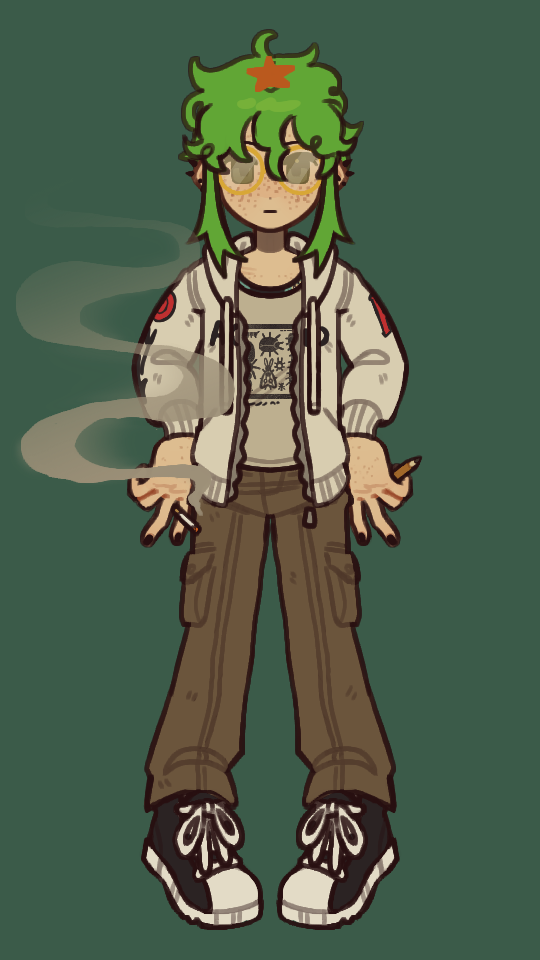
Novocaine - primary caregiver and introject, he/him, 28
likes: teeth, dentist stuff, the effects of pain on others, caring for children and animals
dislikes: people assuming he's cruel, not knowing more about himself
He is a fictional introject of Trash Dentist from the Ghost and Pals and Creep-P collaboration song Novocaine.
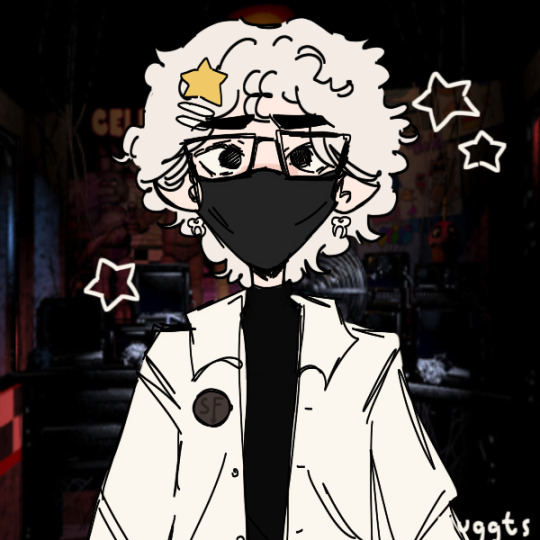
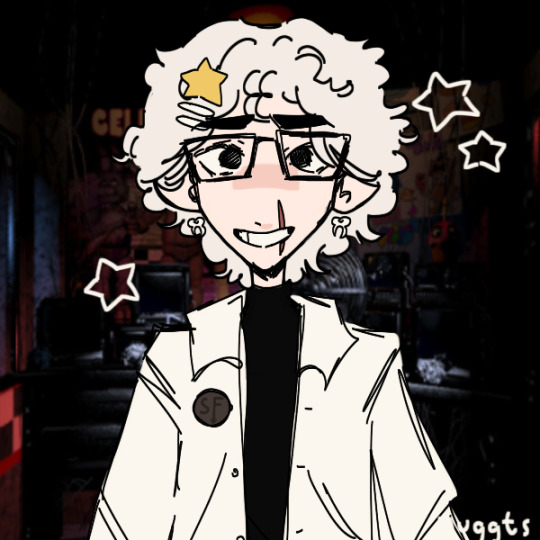
his mouth scar is along his smile line, not an option in the picrew.
Duck - little and self soother, she/her, anywhere between and including 7-12
likes: everything bright and flashy and loud
dislikes: getting yelled at
Small tiefling who loves eyestrain everything and also biting people.
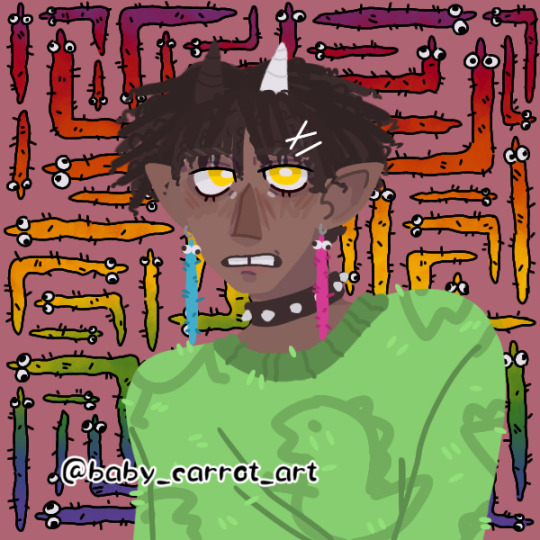
Cetus - ANP and host, she/her, 17
likes: makeup, merfolk lore, cottagecore
dislikes: the fact that Charlie snores
Split sister to Charlie and a lemon shark siren.
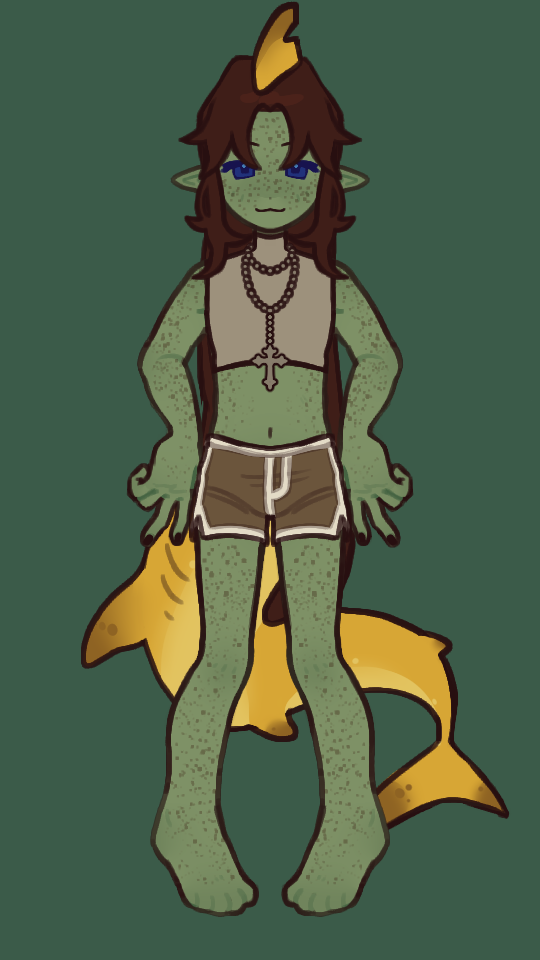
she does not have a fin on her head
Chara - persecutor and introject, he/they, 14
likes: blood, stars, buttercups, knives
dislikes: people who say he was the cause of the genocide run, people who argue over their gender in source
Fictional introject of Chara from Undertale. Literally no primary or secondary sex characteristics.

Mileena - fictional introject, she/her, 21(?)
likes: eating
dislikes: not being able to eat
She's newly discovered and rarely front, so not much is known about her so far. Fictional introject of Mileena from MK11 thought looks more like MK1.

Monika - fictional introject, she/her, 18(?)
likes: poetry, writing, coffee
dislikes: people assuming she's truly a villain even though she is the antagonist of DDLC because there's more to villain than just antagonist, eating
She is a fictional introject of Monika from Doki Doki Literature Club and often struggles with food anxiety, please be careful talking about food and eating around her, thank you!
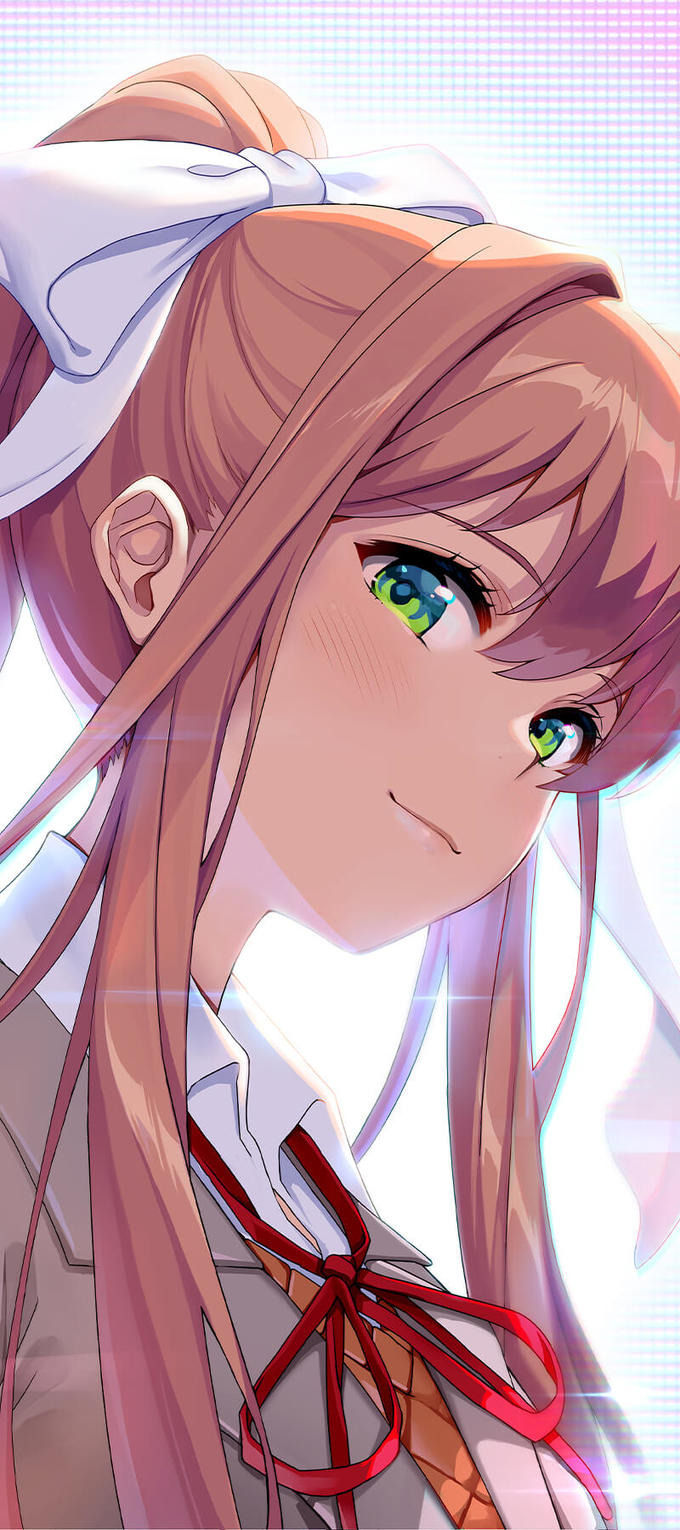
Frisk - fictional introject, she/they, 15
likes: stars, dandelions, their source, Chara
dislikes: being forced to speak, being patronized for being semiverbal at best, fanon Frisk, frans
she is an introject of Frisk from Undertale and they often struggle speaking, though they can, it just hurts her quite a bit to do so.

Sayori - fictional introject, she/her, 18
likes: everything
dislikes: people who don't know what she means by "everything"
She loves people, the Lit Club in particular, she often spends her time bugging her friends and writing poetry
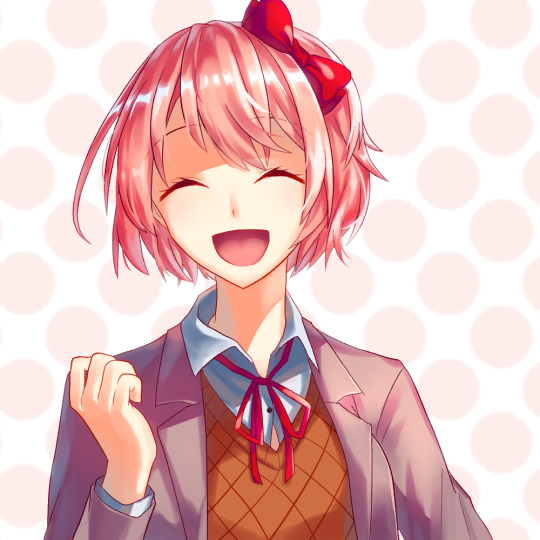
Natsuki - fictional introject, she/her, 18
likes: League of Legends (not joking), cooking, cats (black in particular)
dislikes: loli references and being called a loli
She's really rude and hot-headed, often hurting people... but she does try not to be too awful and often loves people anyway, and trust me, you want to try her eggs (she's the only one who can cook anything and the only thing she can cook is eggs in one (1) specific way)
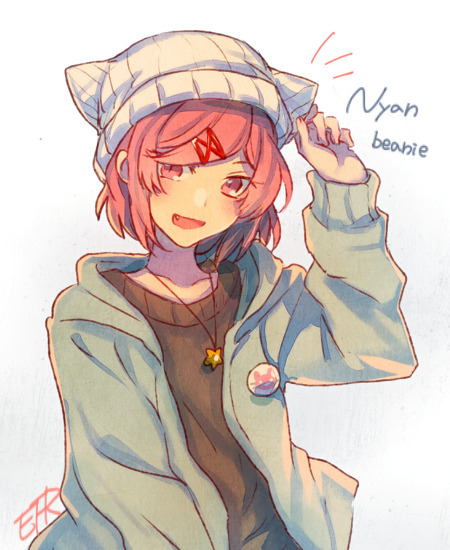
(art by efr-d on tumblr)
Yuri - fictional introject, she/her, 18
likes: Type O Negative (band), Minecraft, tea
dislikes: being referred to as a "yandere"
She's... honestly the least like her source out of all of them. She's not socially anxious, she's just a social reject. She settles herself in the goth subculture and WILL try to talk you into hearing at least one TON song.

(art by failgirlitis on Tumblr)
5 notes
·
View notes
Note
[pulls out giant script] [clears throat] [starts dramatic background music] cry about it
Yeah... that's about the level of a low-tier self-narration and "clapback" attempt that I'd expect from an edgy 16yo "I know everything" high-schooler.
In eight or so years, when your critical thinking really begins to kick in and you emerge from this "coolgirl" hotdog-deepthroating desperate pickme girl stage, I'd very much enjoy being on a fly on the wall while witnessing your floundering backtracking amid all the then-emerging trans lawsuits.
Protip: when a quasi-religious belief movement, like trans, has an *ex-satanic-panic* instigator near the top of the hierarchy, it's maybe not the best idea to blindly chug the kool-aid as a bleating follower. Try researching your opinions, not regurgitating them.
Oh, wait-- you're so young and uninformed you likely have no idea what the satanic panic ideaology was or how scarily much it resembles the new trans ideaology.
The elevator pitch version is: one of the same main instigators of the transrights movement falsely claimed in the early 90s that members of a satanic cult were ritualistically sexually assaulting toddlers. People were witch hunted. Lives were destroyed. She scuttled off and then reemerged high in the trans movement right in the late 2000s - early 2010s. That's not alarming at all, though. Nosirree. That seems non-sus.
The dominoes are already starting to fall on the trans movement. The Cass report is just the beginning -- There is a reason that multiple European countries are already starting to roll back puberty blockers. There is a reason that trans clinics in Britain deliberately refused to keep records and follow patients postoperatively -- which, btdubs, makes the already-skeevy travistock look like a hack job clinic. If a specialty nephrology clinic refused to follow kidney transplant patients postoperatively, they'd be shut down almost immediately and investigated by a government body.
But hey, I look forward to your belated horrified realization that you blindly helped perpetuate a medical scandal unseen since lobotomies were going out of fashion. My own realization in 2021 left me in tears for weeks.
Let's hope that you'll not be one of the droves of people acting as though you never supported experimental surgeries that can leave patients with pain so severe they request euthanasia, much like the droves of people who suddenly started disavowing lobotomies after egging that fiasco on, or the droves of people who disavowed the satanic panic after egging it on. But I have my doubts.
You're cute, kid. I'm serious when I say I pity you for what's coming to your noggin. It's a hell of a realization to grapple with the fact that you enthusiastically supported people harming themselves in the name of "acceptance" and "affirmation" -- no different than if we suddenly started "accepting" and "affirming" anorexic teenage girls by giving them gastric bypass so their outsides matched their insides.
After all, I was a firm trans rights activist from 2006-2021, at which point I finally had been abused and mistreated by enough transwomen, and I had finally seen enough trans people around me have surgeries that destroyed their lives and bodies even though they smiled and pretended everything was fine, that I started asking questions.
Check out Venus Envy sometime. It was a webcomic written by a transwoman who was True Trans, no ROGD, had been claiming to be a girl since 4 or 5.
... he's been detrans for years and won't talk about it now.
Also, you may want to look at what happens with trans end-life and elder care. (It's super awkward when a trans person gets alzheimer's or dementia and then starts screaming and panicking and becoming violent because they don't know what happened to their penis and they want to hurt their caregivers for what has been done to their body.)
But sure. You sure showed me, child who has barely begun to accrue life experience. Truly, you wound me and I doth bleed.
3 notes
·
View notes
Text
Metatext - Adora and Mind Control
(Apologies folks, this one is going to be kind of long and rambling).

While it’s mostly died down, I do still occasionally see people invoke the idea that in SPoP, Adora was magically mind-controlled by Shadow Weaver to justify why she was so okay with, eg, Shadow Weaver threatening to kill Catra for "disrespect” in the pilot.
And (a) No. Like, I can’t control what you put in your fanfics, but that’s just bullshit. If Adora was meant to be mind controlled in some supernatural way, the show would have told us.
(b) I do understand where the idea comes from, but, well. Indulge me in a digression. Let’s talk adaptation history.
The 80′s Cartoon
For anyone who isn't aware: In the 80's cartoon, Adora is a Horde Captain, and thinks the Horde are the Good Guys because Shadow Weaver has been mind-controlling her since she was a bitty baby. Over the course of the TV movie/pilot the mind control is broken, the truth that the Evil Horde is Evil is revealed to her, and she joins the rebellion.
It's serviceable and fun, within the constraints of being an 80's Filmation cartoon.
But those constraints are why mind control is part of the story. Genre convention and broadcaster standards required that the Good Guys be unambiguously Good and the Bad Guys be objectively Bad. There is no space in that moral rubric for a Hero to have motives beyond a compulsion to "Do the Right Thing", or have a non-standards-compliant idea of what the “Right Thing” is.
So to have Adora start the story with the (obviously, objectively) Bad Guys, they needed a way to explain away A Good Person doing Evil Things; their answer was Magic Mind Control. Sure, Adora was the one walking and talking and leading enforcement gangs, but she’s not responsible, because the magic is forcing her to be like that.
Breaking the mind control is a bright line moment, in which Adora instantaneously transitions from being a Powerless Victim to being a Hero Who Does The Right Thing.
And this works as a metaphor, largely because Adora is the only character who explicitly grew up in the Horde. While 80s!Adora is an adult in-universe, she’s still intended as a surrogate for the child audience, and the conflicts she faces come through that frame. Children are dependant on their caregivers to filter and contextualize information, and sometimes those caregivers are shitty people who use that power to their own ends. Mind control isn’t a terrible analogy for that. It’s simplistic, but, you know. 80′s Filmation.
The SPoP Pilot Pitch
Again, if you haven’t seen it, there’s a “Story Bible” floating around that was the original pitch for the series. It’s a fascinating insight into how the sausage is made, but the relevant parts are:
Adora (and only Adora) is still Mind-Controlled into thinking the Horde are the good guys
Catra has been cast as, not just a fellow Force Captain(who is Bad and revels in that Badness), but as a childhood friend of Adora’s.
And that’s. Hrm.
It’s not bad per se, but putting these two idea together makes “mind-control” less an analogy for abuse and misinformation, and more a form of special pleading.
It says that while others raised in a bad environment will accept that badness as normal and acceptable, it would require supernatural compulsion to make Adora do the same.
And because that compulsion is supernatural and external, pitch!Adora is, once again, granted absolution. No matter what she did under the Horde, at the end of the day, it wasn’t her fault.
But while this was a central element of the original pitch, it was dropped at some point during the show’s development.
And that’s where it gets interesting.
2018 SPoP
In the show as aired, the below are still true:
Adora is still weirdly compliant, and treats the Horde as The Good Guys even when they’re being openly, indisputably awful in front of her
Catra is still her peer, still someone who has grown up in the same environment
But, in addition:
The metaphors for abuse have been replaced with actual mundane abuse
Adora is no longer the sole target of said abuse
SPoP!Adora is manipulated and lied to, yes; but she is not uniquely so. Catra knows no more than she does - she is, if anything, slightly more in the dark.

And yet Catra knows full damn well that she is being mistreated, that Shadow Weaver is petty, manipulative, and unfair.
So why doesn’t Adora?
=======
And this is where the great disconnect happens, where a segment of the audience demands an explanation, a revelation of the secret reason for Adora’s awful behaviour. Adora is The Hero, so she must be A Good Person! Why is the show messing this up?
=======
Which is a failure to understand that the lack of an answer is the answer.

The show fails to grant Adora absolution because there is none to be had. There is no excuse, no trick, no double-top-secret easter egg buried in the background that explains how Adora could not have known, that she was but an innocent babe compelled by forces beyond her control.
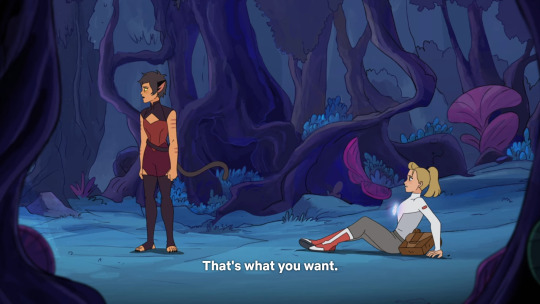
SPoP!Adora never gets a bright-line moment of transition between helpless thrall and agency-imbued hero because there was no transition to make.

Adora was abused, yes. She was manipulated, and lied to, and hurt. But for all the power Shadow Weaver had over her, all the pressures applied, she was never mind-controlled. From start to finish, from the earliest flashback to her dreams of a better future, Adora’s agency and her choices - all of them, good and bad - were ultimately wholly her own.
26 notes
·
View notes
Text
In America's driveways, children are often endangered even when they're sitting still — because their parents' and caregivers' cars are so big that they can't see a small body in their path. That problem has become even more pronounced since SUVs began dominating U.S. roads in the 2010's, many of which have such massive blind spots both behind and in front of the car that TV journalists have taken to lining up classrooms full of preschoolers in front of them to demonstrate their safety hazards. Plumert says, though, that the problem isn't just that kids aren't visible from the driver's seat of a Hummer, but that kids might not always move as quickly as an adult when they see a car coming at them — and if that vehicle isn't equipped with an effective automatic emergency braking system, that could spell tragedy.
"Should these warning systems account for the size of the person behind the car?" she wonders. "Should they, perhaps, give an extra warning if that person is small?"
Plumert acknowledges that education can fill some of the gaps in children's struggles to stays safe on the road, and she's done some promising research that demonstrates that parents can have a big impact on crossing behaviors in particular. At the end of the day, though, it's up to the adults in the room to design streets and vehicles that won't kill a child if they make a mistake, whether because they're being egged on by peers, because they struggle with hyperactivity or inattention disorders, or simply because they're kids who are still learning how to navigate a car-dominated world.

10 notes
·
View notes
Text
I have 2 pediatric pts who had high blood lead levels. Their lead levels are now normal. But one of them has iron deficiency (even though her Hgb is normal).
Individuals who are severely iron deficient can absorb up to 7 times more lead, as the body responds to iron deficiency by dispatching increasing amounts of the iron transporter DMT1 into the gut. Unfortunately DMT1 can carry eight metals including lead and will transport lead if insufficient iron is available.
Source
From UpToDate: To initiate oral iron therapy, we suggest a dose of 3 mg/kg of elemental iron once daily, rather than higher doses. A 3 mg/kg dose of ferrous sulfate is generally effective and is tolerated by most children. For optimal absorption, the iron should be given in the morning or between meals and with water or juice. Milk and/or dairy products should be avoided for approximately one hour before and two hours after each dose.
Meanwhile, the following dietary goals should be implemented to prevent recurrence: •Infants (less than 12 months of age) should be fed with breast milk or iron-fortified formula. Infants should not be given low-iron formula or unmodified cow's milk.
•For patients six months and older, especially breastfed infants, ensure adequate consumption of iron in complementary foods. These include infant cereals, which are fortified with iron, foods rich in vitamin C, and pureed meats.
•For children older than 12 months of age, intake of milk (cow, almond, or soy) should be limited to less than 20 oz per day and bottle feeding should be discontinued to limit milk intake. Excessive milk intake is the primary reason for the development of IDA (Iron Defifiency Anemia) in this age group and can be associated with occult intestinal blood loss.
●After beginning therapeutic iron, perform follow-up testing to determine the response, consisting of a complete blood count (CBC) or hemoglobin (Hgb). The testing should be performed when the child is healthy, approximately four weeks after beginning iron therapy for children with mild anemia or one to two weeks after beginning iron therapy in those with moderate to severe anemia. Follow-up is essential to confirm that the anemia was due to iron deficiency and to ensure that it is adequately treated.
●Management of responders – If the Hgb has increased by 1 g/dL, therapy is continued for at least three months, at which time, the CBC is retested. Iron therapy should be given for at least three months, and many children require longer treatment courses to replenish iron stores. In general, iron therapy should be continued for at least one month after the Hgb reaches the age-adjusted normal range. If possible, a serum ferritin concentration should be measured to check iron stores prior to discontinuation of iron therapy, with a goal threshold of ≥20 ng/mL.
●Further evaluation for nonresponders – Patients who do not demonstrate an adequate response within four weeks of initiating iron therapy should be reevaluated. Potential causes of recurrent or refractory IDA include ineffective treatment (nonadherence or incorrect dosing), ongoing low-iron diet, an incorrect diagnosis, or ongoing blood loss or malabsorption. Our approach is as follows:
•Interview the parent or caregiver to determine whether the iron therapy has been given at the appropriate dose and timing, whether the appropriate diet modifications have been made, and if there has been any significant intercurrent illness (which might cause a transient decrease in Hgb). The most common reason for failure is that the treatment plan was not correctly followed.
•If the patient has indeed been taking an appropriate dose of iron and has not had an intercurrent illness, assess detailed dietary history and/or perform additional laboratory tests to confirm the diagnosis (eg, iron testing, if not previously performed) and rule out conditions that might simulate or complicate IDA such as thalassemia trait or anemia of chronic disease. In addition, for children with persistent or recurrent IDA despite appropriate dietary changes and iron therapy, stool samples should be tested for occult blood. If the results are positive, additional screening should be performed for common causes of gastrointestinal blood loss, including cow's milk protein-induced colitis in infants and celiac disease and inflammatory bowel disease in older children.
●Intravenous (IV) iron therapy – IV iron therapy may be warranted for patients with severe or persistent anemia who have proven oral iron intolerance, malabsorption, or nonadherence despite family/caregiver education and support to optimize oral therapy. Several forms of IV iron therapy with good safety profiles are available for use in pediatrics. Selection among these options may depend on relative costs and availability, time required for administration, and maximum permissible dose per infusion.
4 notes
·
View notes
Photo

“It was true: the other mother loved her. But she loved Coraline as a miser loves money, or a dragon loves its gold. In the other mother’s button eyes, Coraline knew that she was a possession, nothing more. A tolerated pet, whose behavior was no longer amusing.”
warnings for: emotional abuse and child manipulation.
WHAT IS PRINCESS BY PROXY SYNDROME?
princess by proxy syndrome, a subcategory of achievement by proxy distortion (ABPD), is a pattern of adult behaviors that occurs when an adult’s pride and satisfaction are achieved through a child’s activities. parents and adults who lovingly and compassionately support children’s activities are normal. those with ABPD objectify their children, seeing them either consciously or unconsciously as a means to obtain financial or social gains for themselves. studies show that sexual objectification can put a child at risk for abuse and neglect.
ABPD is often seen as a sub-set of munchausen syndrome by proxy (MSbP), a condition in which a caregiver creates the appearance of health problems onto another, often their child. as a proxy disorder, they are forced from one person onto another [unwillingly]. in annie’s case, her mother [donna january]’s desire to be a superhero was forced onto annie, as seen in 3.03 when donna mimics the dance that annie is doing on stage at the little miss hero pageant contest.

annie spent her childhood in superhero pageants & lacking time in regular schooling, [‘she took me to all the little miss hero pageants, but i hated it.’ 1.01] isolating her from normal peers & children her age.
AS SOMEONE SIGNIFIGANTLY MORE POWERFUL THEN HER PEERS, annie wasn’t allowed to participate in any group games or school sports, due to having such a large advantage over them.
the majority of social contact with people her age that annie was allowed & given, were with children in pageants but even then, her mother played them as her rivals and annie wasn’t allowed to actually befriend them. she heavily lacked normalized social interactions and grew up on the platform her mother placed her on. [part of this plays into an internal concept & mentality that she sees herself as a doll / doll limbs / doll pieces]. the following excerpt is from 1.08.

as seen in 3.03, despite being at a pageant with other young superheroes, annie doesn’t speak with them & only interacts with her mother, being repeated brushed off by her mother despite being in physical pain. she was systematically isolated so that she only had her mother as a friend figure & would be unable to reach out to others. seen below is two screencaps from 3.03.


annie was heavily emotionally abused & manipulated by her mother, forced into the role of ‘starlight’ and unable to have any influence in her own childhood or make any of her own choices. she was isolated, emotionally abused & manipulated by her mother into her entire existence. the first real choice annie makes in her life is speaking up at the believe expo, giving her a chance to make herself into a real person. it takes truly a long time for annie to become independent from her mother & her abuse/manipulation.
“Today’s tot glitz pageants are a multi billion-dollar industry. The entry fees coupled with extravagant costumes and makeup run up the participant tab to several hundred, if not thousands of dollars. The financial investment often exceeds the top cash prize. Parents who invest thousands of dollars in tot pageants for the rare chance at fame are exhibiting the first stage of ABPD called “Risky sacrifice.” With risky sacrifice, the adult loses the ability to differentiate their needs for success and achievement from the child’s. Parents may make risky financial decisions to support the child’s perceived abilities; rationalizations to justify the child’s intensely focused participation in a specific activity (eg: pageants) and increasing pressure for the child to perform no matter what are characteristics. The pageants I attended were rife with this behavior with many parents saying textbook ABPD risky sacrifice comments like, “It costs a lot of money and we are in debt, but my daughter likes doing the pageants.” Really? The kid is two years old. Or “My daughter is in the first grade but sometimes we miss school so we can get to a pageant. We’ve invested so much in her coaching and outfits that we’d hate to lose it.” Priorities, anyone? The second stage of ABPD is “Objectification.” In this stage the adult can’t differentiate their needs and goals for success from their child’s. The adult wants their child to win at all cost and there is an excessive focus on the pageant or sport. The child may be forced to train or perform beyond their abilities or in the case of pageants, don an unrealistically flawless appearance. The pageants I attended judged contestants on flawless appearance, poise and personality….however none spoke a word so personality was based on looks alone. Some hypercritical parents chastised their tots for not “performing” or looking less than perfect, openly blaming the child for “failure” and insisting that the child would practice more or “learn to look perfect.” The last stage is “Potential Abuse.” This is a severe or complete loss of the adult’s ability to differentiate their needs and goals from the child’s. At this level, the child is at risk for exploitation and is often forced to continue the sport or in this case, pageant activity despite potential physical or emotional harm; this is often done in an effort to provide financial or material gain for the adult.” - PSYCHOLOGY TODAY.
#yeah i'm reposting (& partially re-writing + adding) an old meta!!!!!#it was good!!!!!#child abuse cw#child neglect cw#emotional abuse cw
5 notes
·
View notes
Text
!! PINNED POST !! ૮ ˶′ﻌ ‵˶ ა
hi all!! please call me Caine :3 this is my sfw / child safe side blog! I mostly just reblog things. here's some stuff about me!
name: Caine 🐶
big age: 20 🐾
little age: undefined 🧸
gender: nonbinary ⚧
pronouns: he/they 🏳️⚧️
species: wolf, puppy 🐺
✅ I like:
✅ wolves and dogs! animals in general, actually. no wait nature. all of nature 🌱
✅ drawing and colouring and painting 🎨
✅ reading 📚
✅ my stuffies 🧸
✅ going on walks and playing outside 🌳
✅ child-friendly spooky things (Spooky Buddies 2011, Coraline 2009, campfire/ghost stories, Halloween) 🎃
✅ Minecraft and Slime Rancher (1&2) 🎮
❌ I dislike:
❌ scary things (real or depicted blood/gore, jumpscares, graphic depictions, violence, aggression, content unsuitable for children under the age of 9) ❌
❌ adult men (it's a trauma response, please don't take it personally, I promise I don't think you're a bad person you just make me uncomfy) ❌
❌ discourse, it isn't on my DNI but I do not interact with it on this blog ❌
❌ tomatoes ❌
❌ the colour orange ❌
❌ live action tv ❌
⚠️ Boundaries:
⚠️ Do not ask me to be my caregiver ⚠️
⚠️ Do not ask me to be your caregiver ⚠️
⚠️ Do not call me pet names if you do not know me (eg. babyboy, sweetheart, little one) ⚠️
⚠️ I will not answer PMs from minors or ageless blogs, sorry. I have nothing against you I am just not interested in interacting personally with minors ⚠️
⚠️ Do not flirt with me under any circumstances, it is not welcome here ⚠️
DNI:
🚫 General bigotry (queerphobia, racism, misogyny, ableism, hate speech, etc)
🚫 18+ content blogs (you know who you are)
🚫 Blogs with heavy themes of mental illness
0 notes
Text
nmj caregiver hc’s + moodboards
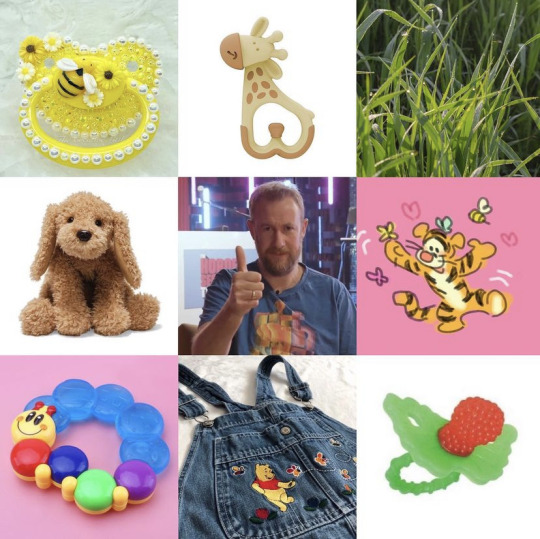
a.h.
- outdoor dad
- limited screen time
- finger painting
- bug collecting
- crafts (eg. pet rock, pressing flowers, designing monsters)
- tells interactive stories!
- electronic drum pad
- overalls + jeans + bucket hats
- teething necklaces + fidgets
- road trips with screen-free toys
- slides
- “you’re alright! just a scratch!”
- daniel tiger

m.w.
- anxious carer
- little to no junk food (eats veggies and dip with you)
- more nervous about playdates than you are
- let’s you cover him in stickers
- colors with you
- quiet time
- watches wild krats (loves it)
- kneepads + helmets whenever he can reasonably get you into them
- popcorn/cereal/candy necklaces
- star ceilings
- freaks out over injuries
- swings

t.k. not happy with this board at all :\
(fem!little)
- plays barbershop with you
- bedtime stories
- dries + styles your hair (v attentive) (he loves it)
- picks out your clothes to match
- always carrying you
- kisses !
- “princess” “darling” “little one”
- stands you on his feet and dances with you
- probably buys you a hoverboard (expensive gifts in general)
- let’s you paint his nails
- tea parties + playing dress-up with you
- curses around you + tries not to laugh when you copy him
- monkey bars
- creates a feral child tbf
- let’s you watch his shows with him (doesn’t often put on kids shows anyway)
collective:
- “kiddo”
- s’mores
- cooking helper :) little chef
- brushes teeth together
0 notes
Text
Family Issues
Families come in all Shapes and Sizes , from Nuclear to Extended to Biological families , to Foster families and Families of Choice. The family might include - Parents , Siblings , Grandparents , Spouse , Children , Extended family and Others.
The idea of family members means different things to everyone - may be valuable source of love , support, security while it can also be a source of pain and stress
What are Family Issues ?
Family issues are when conflict between or related to family members becomes especially intense or frequent that it interrupts your daily life.
Some degree of conflicts is normal and dynamics for each person may be different but when they can't resolve conflicts and intensify around the relation becomes overwhelming. It can lead to Mental Health Conditions such as Anxiety.
How Common are Family Issues ?
Because family problems vary so much and these concerns are deeply personal , it's hard to say for sure how common they are . Whatever challenges are, there are likely countless other people facing similar issues are there families.
What are Signs and Symptoms of Family Issues ?
Family Problems are different for everyone and vary widely with their emotional and psychological responses
Most common are -
1. Anger or Worry - you are frequently preoccupied with concerns about your family and struggle to focus
2. Sadness or Depression - feeling of tension , conflict or disconnection from your family might make you feel sad
3. General Stress - you have trouble sleeping , muscle tension , headaches , and digestive trouble often due to family worries like financial trouble or other money problems etc
4. Conflicts with other Loved Ones - if a relation with one person is upsetting then you might have issues come up with other people you are close to eg tension with a parent might make you more sensitive in your relation with your partner .
5. Low Self Esteem,- feeling insecure or threatened within a relation that means alot makes you doubt yourself and your worth.
Different Types of Family Issues -
Issues come in countless forms and it is an exhaustive list.
Some common forms of Family Issues include -
1. Parent Child Conflict
2. Issues with Siblings
3. Conflict around Culture , Religion or Lifestyle
4. Caregiver Stress
5. Common Issues
6. Violence , Abuse or Gaslighting
What to do if you are Experiencing Family Issues
If you are experiencing family stress , conflict or danger in your family relations , you have options - some are
1. Therapy
2. Meditation, or Mindfulness Practice
3. Journaling
4. Connect with other Friends or Loved Ones
5. Connect with Hotlines and Safety Resources.
0 notes
Text

Golden Stars ABA offers personalized ABA therapies near me tailored to your child's skills, interests, and family situation, resulting in meaningful behavior improvements. Please book an appointment with us to discover the potential benefits, drawbacks, and debates surrounding ABA clinics near me. Positive reinforcement motivates the individual to develop and maintain skills, ultimately leading to significant behavioral progress through this applied behavior analysis program.
Autism Applied Behavior Analysis (ABA Therapy)
At the end of the day, when members of the child’s care team have returned home, the caregiver’s role is to continue learning and support behavior outside of formal service delivery. If parents and other caregivers have not received effective and ongoing training in treatment procedures, or if family dynamics have not been adequately addressed, treatment response or outcome may be slowed.
The results of the applied literature and the results of clinical practice tell us that the involvement of parents and guardians in the care of a child increases the effectiveness of the therapeutic program and creates optimal conditions for the preservation and generalization of skills over time.
Highest Quality Services by Golden Stars ABA Such as:
ABA Autism Therapy
Autism Therapy Services
Treating Autism Spectrum Disorder
Autism Applied Behavior Analysis
ABA Therapy Near Me
Autism Occupational Therapy
ABA Behavior Therapist
Certified Behavior Analyst
ABA Autism Therapy
For children and families who need help with certain problem behaviors, who are on waiting lists or live in rural communities. Sometimes a family may not receive care, which includes the provision of supervised technician services by a behavior analyst.
This may be because the family needs targeted training for a variety of behavioral problems at home or in the social setting (eg. treatment rather than a full treatment program), the family may be on a waiting list for full treatment that includes the provision of services by a technician, or the family may live in a rural community where these services are not available.
When a family needs targeted care training to address specific undesirable behaviors that impair a child’s success at home, at school, or in the community, parent training with a behavior analyst is an option.
Golden Stars ABA - Given the large number of children waiting for ABA Clinics near me for aba autism therapy, parent training may be an option for families who want to access and expedite their child’s treatment.
Your child may be on a waiting list for services to perceive the benefits of ABA, or services may not be provided in the area where the family currently resides. Once a treatment plan has been evaluated and developed, caregivers can be trained to begin implementing learning and behavioral protocols, under the supervision of a behavior analyst, to alleviate their child’s symptoms.
If the best ABA services near me is what is available to your child while you are in educational counseling with us, the supervising behavior analyst will work with the new ABA provider to transition your child’s clinical care. If you are interested in targeted parenting education services, please contact our office to speak with our provider.
#golden star aba#aba clinics#aba services#aba therapies near me#aba therapy near me#aba autism therapy
0 notes
Text
Preschool Kids: Ideas to Support Learning at Home

During the coronavirus crisis, parents whose children typically attend preschools are now managing their young children's enrichment and education at home. We know that most parents cannot replicate a full day of preschool, along with all of their other responsibilities. But here are some guidelines and principles to help you care for your 3-5 year old at home at any time you have available.
Best CBSE Schools in Coimbatore
Learning and development goals for children ages 3 to 5
The basis for future academic success is laid throughout the preschool years.
Fine motor skills: safe cutting with scissors, grasping with a pencil, colouring, forming letters/numbers
Self-regulation: listening intently for longer periods of time, sitting still for longer periods of time
Regulation of emotions: healthy separation, ability to calm down, tolerance of frustration
Social growth: conflict resolution, sharing, reciprocity, and empathy
Early academic skills: letter identification, letter-sound associations, number identification, counting, basic concepts (shapes, colors, textures), basic rules of print conventions
Activities of Daily Living/Independence: Putting on and taking off sweater, managing personal belongings
Creativity and imaginary play: using an object in new ways, sharing imagination
Self-confidence as a learner
How children from 3 to 5 years old learn
Learning during this period takes place almost effortlessly as children interact with sensitive caregivers, explore the environment around them, and play. The human brain was built to learn, and children this age are strengthening neural connections as they use them.
Your child's experiences and activities will literally grow their brain and improve their capacity for learning. Introduce your preschooler to a language-rich environment, a variety of rich sensory stimulation, and allow them hands-on opportunities to explore basic concepts (such as shape, color, and texture) and the environment.
CBSE Schools in Coimbatore
What is the role of parents?
Although preschoolers are capable of independent play for short periods of time, parents will need to organize their child's day, schedule structured assignments, help with transitions between activities, and provide necessary scaffolding and encouragement.
Create structure. Children need predictability in their days just like adults do. Also, consistency and routine help children develop and learn. Through repetitive routines (eg, bath time), children learn about sequence (what comes first, next, last), build vocabulary and conceptual knowledge (eg, wet, slippery, faucet, drain ) and develop autonomy (obtaining their own towel or cleaning bath toys on their own).
Check with teachers. If your child's preschool teacher is available, it may be helpful to schedule a time to check in with him or her and discuss suggestions for specific activities. If your student receives additional services, try contacting providers to see if they can suggest ways she can help continue treatment and maintain gains at home.
Talk to your child. Almost any activity that a preschooler participates in provides an opportunity to talk, introducing new vocabulary as well as shapes, colors, sizes, and numbers. “Serve and return” interactions, or the verbal and nonverbal reciprocal exchange that takes place between a child and her caregiver, also facilitate attachment and a sense of self.
Current projects. Projects, which can include coloring, building, sorting, or sensory play (such as a water table or sandbox) are great opportunities for your child to experience your full attention, which helps reinforce a sense of importance. Commenting, reflecting and praising your child's work gives them a sense of accomplishment and self-esteem, and praising your child's effort helps with the development of determination.
Generate unstructured games. Independent play is very important to encourage creativity, problem solving and autonomy. Offer your preschooler a variety of art supplies (crayons, markers, chalk, finger paints), building materials (blocks, Magna-Tiles, Legos) or pretend play props and let them build their own craft or game . If they run out of ideas or materials, offer a new material and see if they can switch to a new way of playing on their own.
How to structure the day
While it is not necessary (or realistic) during this COVID-19 crisis to create a strict, regimented schedule, having a general “pattern” for the day will help relieve stress for you and help your child feel safe. The following advice can help you create a schedule:
Wake up at the same time, change from pajamas to “real clothes” (whatever that means to you), and eat breakfast at the normal time
Play a variety of games in succession throughout the day.
Build regular breaks into the schedule, which should include opportunities for exercise and free play
Eat dinner together as a family and use that time as an opportunity to talk about the day and solve problems together
Best CBSE Schools in Coimbatore
Types of play that support learning in children from 3 to 5 years old
When considering how to fill your child's day, it's helpful to consider the different types of play that help support different areas of their development:
Constructive play: blocks, Magna-Tiles, Legos, building a fort, coloring and crafts.
Physical Play: Run, Jump, Hide and Seek, Simon Says, Musical Chairs
Pretend play: dress up, dolls, cooking, action figures, modified “guess, guess” (e.g. have your child act like an animal and guess what they are)
Sensory play: sand table, water play, finger painting, putty, baking bread
Music game: listen to music and children's songs, play musical instruments, sing
Outdoor play: nature walk, pick flowers, identify objects or flowers when they come out
Reading time: read aloud and quietly with books
screen time
Under normal circumstances, we recommend limiting screen time (the American Academy of Pediatrics and the World Health Organization suggest no more than one hour for children ages 2-5, ideally while watching alongside a caregiver). During the COVID-19 crisis, screen time can be incorporated into a balanced activity diet and should be used strategically, such as when you need less attention from your child (such as when you cook dinner, work, or help sibling with school work). For a list of free, accessible online resources, download our guide 'Remote Learning Resources for Families' from the Child Mind Institute, which includes educational programming, suggestions for movement breaks, museum visits, book reading times, and more. plus.
CBSE Schools in Coimbatore
How to Build Independence in Preschoolers
During the preschool years, children begin to truly develop their sense of independence. This is immensely important in building confidence and a sense of self. Ways you can encourage independence while at home in the COVID-19 crisis include:
Structure the day. Just like adults, when children can anticipate their day, they are better equipped to take responsibility.
Start small. Before going out, for example, your child can put on his own hat and get his shoes out of the closet.
Let your child choose. Involve them in choices, like what to wear. This does not mean that they have free rein. Provide 2-3 options and then praise their great ability to make a decision!
Let your child help you. Children love to help! When you allow your child to help, even if it takes her longer to do things, you build her confidence and give her the opportunity to learn something new.
Let your child solve problems. Let your children try difficult things and solve (small) problems on their own. Wait until they ask for help or assist only to take them to the next step in a task. You can acknowledge that something is difficult and let them know you're proud by offering praise for trying something on their own or for the first time.
Assign chores to your child. Simple chores like picking up toys or putting laundry in the basket allow your child reasonable responsibility, and those chores also help maintain routine and structure throughout the day.
#CBSES schools in Coimbatore#Best CBSE Schools in Coimbatore#CBSE Schools in Coimbatore For 11th and 12th#cbse schools in coimbatore with hostel facilities
0 notes